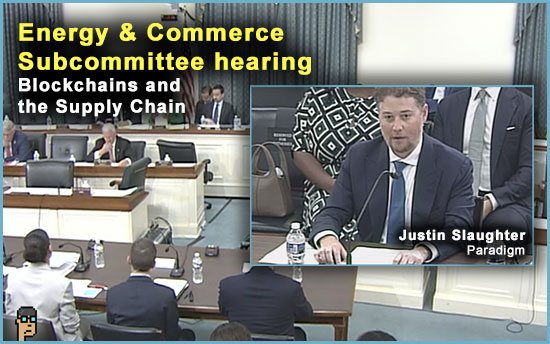Energy & Commerce
Yesterday, House Energy and Commerce’s (E&C) Innovation, Data, And Commerce Subcommittee held a hearing titled, “Mapping America’s Supply Chains: Solutions to Unleash Innovation, Boost Economic Resilience, and Beat China.” See the hearing page.
Committee Chair Cathy McMorris Rodgers (R, WA) and Innovation, Data, and Commerce Subcommittee Chair Gus Bilirakis (R, FL) said in announcing the hearing that the goal was to secure “our long-term global competitiveness in retaining manufacturing, spurring startups, and applying emerging technologies like artificial intelligence, blockchain, and ‘Internet of Things.'”
Subcommittee Chair Bilrakis and Ranking Member Jan Schakowsky (D, IL) presided over the hearing.
See the video of the two-hour hearing.
Energy & Commerce – use cases
Among the witnesses was Justin Slaughter of crypto venture firm Paradigm. In his prepared testimony, Slaughter provided blockchain technology use cases already in process. He wrote, “…the US Air Force has a blockchain-based supply chain project called BASECAMP, which helps the Air Force ensure timely and secure manufacturing of its essential equipment, and provide a reliable supply of needed parts for maintenance, supporting the ongoing operations of our military globally.”
Download Slaughter’s testimony (PDF) – a crisp example of the discussion around blockchain technology beyond financial applications, i.e. not crypto.
Slaughter was the only one of the witnesses who spoke to blockchain in their prepared testimony. During the hearing, Slaughter even discusses how unions (i.e. organized labor) see benefits of blockchain.
Energy & Commerce – legislation
According to the hearing’s memorandum, the E&C Subcommittee hearing also supported new, still unnamed, draft legislation related to the supply chain including one bill introduced by Rep. Larry Bucshon (R, IN) involving blockchain technology. “The bill would also establish the ‘National Blockchain Promotion and Deployment Program’ at the DOC (Department of Commerce). The bill would designate the Secretary of Commerce as the principal advisor to the President of the U.S. for policy pertaining to the deployment, use, application, and competitiveness of blockchain and other distributed ledger technologies; and authorize the Secretary to act through the program as necessary and appropriate to promote and assist the deployment, use, application, and competitiveness of blockchain and other distributed ledger technologies,” reads the memo.
Energy & Commerce – commentary
In his opening statement in the hearing, Rep. Buschon said he was “glad that this draft legislation will establish a program to have the Department of Commerce promote the use of blockchain technologies blockchains can help secure our supply chains by providing American producers with information on the sourcing of component parts of an end product. This will provide the producer and the Department of Congress commerce with critical information on supply chain, vulnerabilities.”
Energy & Commerce Ranking Member Frank Pallone (D, NJ) advocated for his party’s own legislation saying about Bucshon’s bill, “It’s important that we have this discussion but unfortunately (…) Rep. Buschon’s discussion draft is not nearly as comprehensive as the Supply CHAINS Act, and would therefore leave our nation vulnerable to further supply chain disruptions by our adversaries, like China.” Pallone hopes for bipartisan cooperation in the future on the supply chain topic.
budget estimate
The Congressional Budget Office (CBO) reported out the estimated cost of [H.R. 1747], Blockchain Regulatory Certainty Act, on Tuesday. Back in March, the bipartisan bill was re-introduced by Majority Whip Tom Emmer (R, MN) and co-sponsored by Rep. Darren Soto (D, FL) and aims to ring-fence blockchain developers and service providers from certain money transmitter license and financial reporting requirements.
CBO reported, “Based on information from the Financial Crimes Enforcement Network (FinCEN) and subject matter experts, CBO expects that H.R. 1747 is largely consistent with the agency’s current regulations and would largely codify existing policies and guidance. However, the bill could provide a safe harbor for a small number of entities who are currently subject to federal anti-money laundering regulations. As a result, CBO estimates that FinCEN would incur administrative costs of less than $500,000 over the 2024-2028 period to issue new guidance and conduct outreach to the private sector. Any spending would be subject to the availability of appropriated funds.” Read more.
SEC Chair to appear
The long-rumored appearance of Securities and Exchange Commission Chair Gary Gensler in front of the House Financial Services Committee and its Republican majority for an Oversight hearing has been scheduled for Wednesday, September 27 at Rayburn House Office Building. See the press release. No doubt digital assets will be on the agenda along with a host of issues related to the Commission’s aggressive rule-making led by Chair Gensler, a Democratic appointee of the Biden Administration.
Warren bill update
The Digital Asset Anti-Money Laundering Act introduced by Senator Elizabeth Warren (D, MA) added a co-sponsor, U.S. Senator Sheldon Whitehouse (D, RI). Including Sen. Warren, this makes 14 Senators who are now attached to the bill, which is considered draconian by the digital asset industry. See more on Congress.gov.
Meanwhile, Benzinga reports that “endorsements for the bill have come from various organizations, including the Bank Policy Institute, Massachusetts Bankers Association, and Transparency International U.S., among others.” Read that one.
still more tips
PayPal adds its PYUSD stablecoin to Venmo in push to expand crypto reach – Fortune
States Are Transforming Crypto as Congress Remains Stuck – Barron’s
LayerZero swaps Chainlink for Google Cloud: A move away from decentralization? – Blockworks
The little-known blockchain firm behind Southeast Asia’s digital payment systems – Rest of World
SEC’s Crypto Enforcement Chief Warns More Charges Coming to Exchanges, DeFi – CoinDesk

